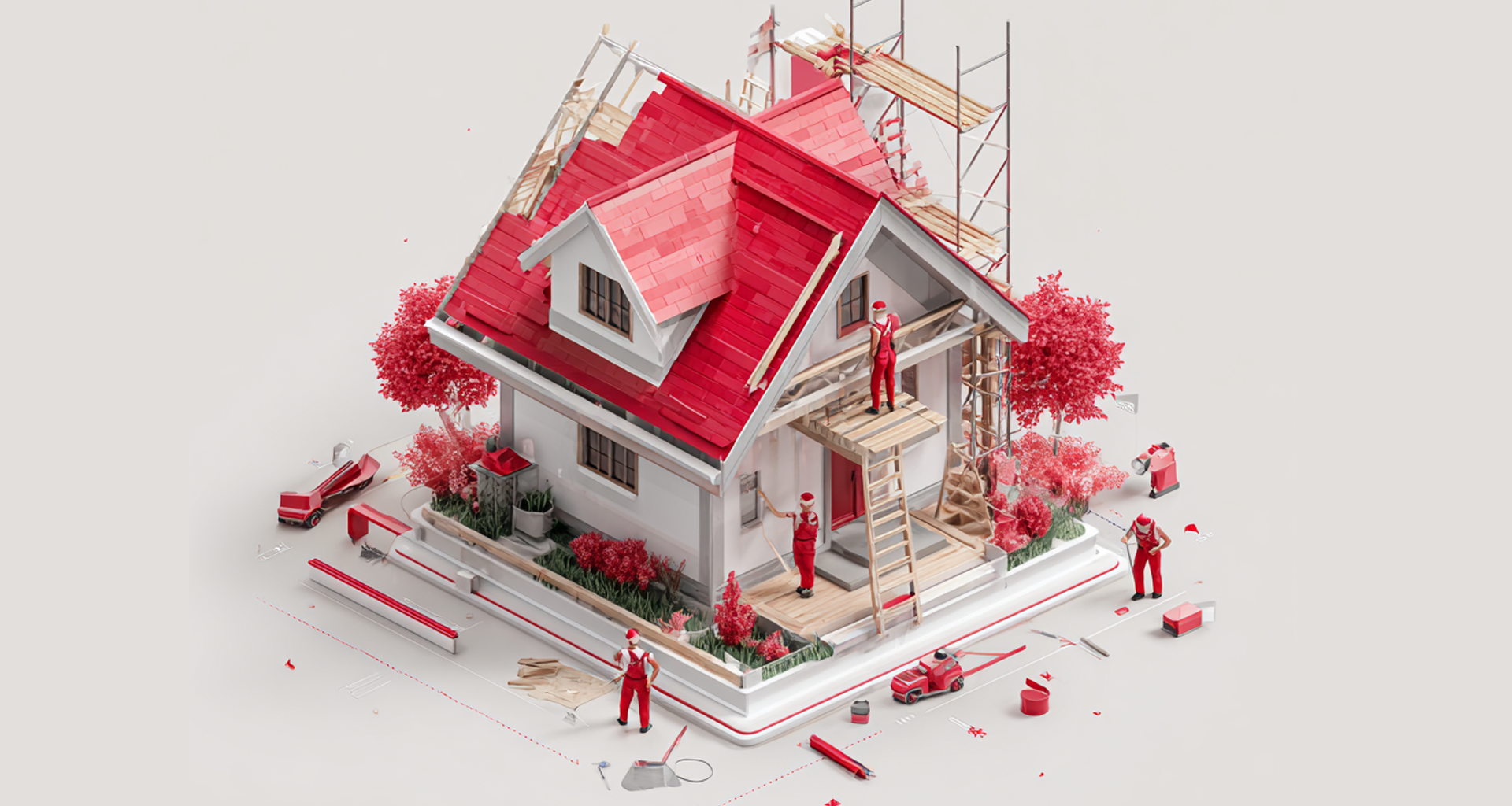
If you are not redirected within 30 seconds, please click here to continue.
Samedi: 10h – 16h HAE

If you are not redirected within 30 seconds, please click here to continue.
If you are not redirected within 30 seconds, please click here to continue.
How Renovations May Affect Your Home Insurance Rate

A lot of us are spending more time at home since the COVID-19 pandemic upended the usual routines in our lives. More Canadians are working from home since the virus struck and government lockdown measures were introduced, and we may continue to do so for many months to come.
Spending as much time at home as we are nowadays can get your mind wandering. Some of us may be getting the isolation-induced home renovation bug. The more you look around your digs, the more things you might see that you’d like to change.
Rates.ca asked Canadians if they did or planned to do any renovations to their homes during the pandemic, and a total of 16.44% say they did while 10.1% plan to undertake renovation work to their homes soon.
In terms of the age demographics of people who have renovated their homes or will, here’s how Canadians responded:
| Age group | Have done renovations | Will do renovations |
|---|---|---|
| Gen Z | 16.6% | 20.7% |
| Millennials (Gen Y) | 16.4% | 20.9% |
| Gen X | 38.1% | 42.9% |
| Boomers | 28.9% | 15.5% |
- Gen Xers (people born between 1965 and 1980) were among the most active doing renovations so far this year (38.1%), and are the most likely to launch new home reno projects in the next few months (42.9%)
- Many Baby Boomers (people born between 1946 and 1964) are also renovating their homes (28.9%), but only 15.5% intend to take on a home reno project in the future
5 renovation projects that may affect your home insurance premium
Many factors affect your home insurance rate. In terms of renovations, here are five things that may increase or decrease your rate:
1. Replacement cost
Homes with expensive finishes like marble, hardwood, and granite will cost more to insure than a home with more modest materials. Insurers look at the replacement value of the home, which is the cost to rebuild your house if, for example, it is destroyed by a fire. Also, the greater the square footage your home is, the more it will cost to insure. The replacement cost does not include the value of the land and is unrelated to the market value of your home. You may be thinking about finishing your basement or creating extra office space, which will increase the value of your home, and in turn, your premium.
2. Swimming pools and hot tubs
Swimming pools and hot tubs will not only increase the replacement value of your home, they also increase the risk of water damage or the potential for a liability claim if someone drowns or is injured on your property.
3. Electrical wiring, heating, and plumbing
Homes with newer electrical, heating and plumbing systems are often less susceptible to fire, floods, and other hazards, which means you're less likely to make a claim. It can be challenging to get insurance for a home with knob and tube or aluminum wiring. An insurer may require electrical inspection by a certified electrician before offering coverage. Depending on the state of the wiring, an upgrade to copper may be required to get insurance.
If you’re installing a wood stove or fireplace, you face a greater risk of fire, and your premium will reflect that. Also, if your home is heated by oil, that too increases risk. A fire monitoring system can help reduce risk and possibly lower your premium. Even installing smoke and CO2 dioxide alarms are an inexpensive and smart way to lessen your fire risk.
Likewise, with old plumbing like galvanized or lead pipes, which are more likely to rust, crack, or corrode than their newer copper or plastic plumbing counterparts. Older plumbing presents an increased chance of water damage and an insurance claim, which means you’ll likely pay increased premiums. Reducing your flood risk may include installing a backwater valve (which can help prevent sewers from backing up into your home) and having a sump pump with a battery backup (to reduce the chances of rising water levels flooding your basement). Many insurers will provide a discount if you have these in your home.
4. The roof
An older roof increases the chances of leaking and other damages. If your roof is more than 20 years old, it may be challenging for you to get coverage unless you replace it. Although damage to a roof caused by wind or hail is usually covered under a home insurance policy, investing in a roof replacement will help decrease your premium and protect your home.
5. Tenants
Renting out a portion of your home could affect your home insurance premiums as it is no longer a single-family dwelling. Instead, it is a multi-family property where the increased risk is factored into the home insurance premium. If you take in a tenant to help supplement your income during the pandemic, you will need to change your policy to reflect that. It’s worthwhile to encourage anyone to whom you rent a room or basement apartment to get tenant insurance to help protect their possessions and provide them with some liability coverage.
Other factors that affect your premium:
- The age of the house. Older homes may be more vulnerable to structural weaknesses, as well as plumbing and electrical failures. Newer dwellings tend to have modern systems that lessen the risk of such hazards. If yours is a new home, some insurers may offer a ‘new home discount’ on your policy. Keep in mind any damages to your home that are a result of poor maintenance will not be covered. It’s important to remember a home insurance policy is not a home maintenance plan.
- Your neighbourhood. On average, homeowners in Ontario and the Atlantic provinces pay the most for insurance in Canada at an average of $1,284 a year, according to a 2018 report from consumer research firm J.D. Power. Quebeckers pay the least at an average of $960. Western provinces average about $1,200. Insurers break down the likelihood of claims by neighbourhood, using postal codes. The higher the incidence of crime or vandalism, the more likely the claim, and the higher the premium.
- You home insurance claims history. Like auto insurance, your history of claims factors into the home insurance premium you pay. If you need to file a claim because of damage to your abode, do it. A single claim is unlikely to affect your premium, but you may lose any claims-free discount you currently have.
- Proximity to fire hydrants and emergency services. The distance your house is to the nearest fire hydrant is a factor, as is the distance to the closest fire and police stations. It may be a significant factor if your home is in a rural community.
- If you manage a home-based business. A homeowner’s insurance policy is not designed to cover a place of business. Many Canadians are currently working from home. If you are, contact your insurance provider and let them know.
While no one fancies paying more for home insurance, it’s important to ensure you have adequate coverage. If you make renovations and don't inform your insurer, you may run the risk of being underinsured. So, if you experience a loss due to a flood or fire and need to file a claim, the coverage limits on your existing policy may not account for the improvements you’ve made, which could lead to tens of thousands of dollars coming out of your pocket. Moreover, if someone is injured on your property, such as a tradesperson or a new tenant, do you have full liability coverage to cover that cost?
Don't waste time calling around for home insurance
Use Rates.ca to shop around and compare multiple quotes at the same time.
Finding the best home insurance coverage has never been so easy!
Got renovation plans? Don’t forget about insurance
Your home insurance policy covers you for insured losses such as theft, water damage, and vandalism. However, they may be limited or excluded during renovations, even for do-it-yourself jobs.
Before you whip out your power tools and start making changes to your dwelling, consider if the renovation will affect your policy in any way. Here are a few things to do before you start and after:
- Contact your broker or insurance agent in advance. During renovations, your place may be considered a construction site, which increases risks such as theft or water damage. Talk to your broker about what your plans are, make sure your policy remains in force, and you have adequate coverage for the work being done.
- If you’re hiring contractors, ask for proof of insurance. Contractors should have liability coverage for their work as well as coverage if they are injured on your property. Also, get a written estimate from the contractor that details what they will do with an itemized breakdown of the costs, the total cost, and the project start and end dates.
- Consider your home’s replacement value. If the work being done increases your home’s value, it may affect your premium. For example, if you’re finishing your basement, that will raise the value of your dwelling. You are obligated to tell your insurer of any changes you make to your home or property.
Renovating or re-modelling your digs can be exciting but take the necessary steps to avoid disappointment and protect yourself before reaching for the hammer and nails.
Everyone wants to save money on insurance, and there are discounts available for which you may be eligible. Plus, taking a few minutes to compare home insurance policies and premiums whether your policy is up for renewal or not may save you a significant chunk of change.
About the survey
A digital survey of 2,500 Canadians aged 18 years or older was conducted using Google Survey from August 27 to September 8, 2020.
Get money-saving tips in your inbox.
Stay on top of personal finance tips from our money experts!










